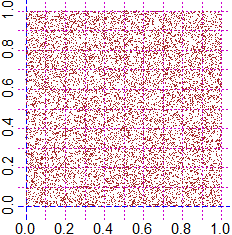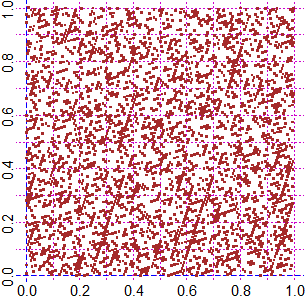# The computer, as well as studying large amounts of data, is useful for simulating
# random phenomena. The various programming languages have incorporated a pseudo-random
# number generator. There are several random number generators.
#
# Let's look at the generator used in JavaScript, on which the "dadi" and "n. casuali"
# scripts present here are based.
# With the last script, I generate 100, 500 and 2500 numbers between 0 and 1 with 3
# decimal places and represent them with the "histograms" script using 10 intervals:
#
 # Uniformly distributed numbers between 0 and 1 are generated.
# I can easily verify that as the number of tests increases, the histogram tends to
# flatten.
# It is not enough to see that the outputs tend to be uniformly distributed. For
# example, if I want to simulate the launch of two dice or the distribution of a hand
# of 10 cards, it is also necessary that an output is independent of the next. The
# study of how to make a random number generator involves many areas of mathematics and
# we can not focus on the topic here. Let's just see, to increase our belief that it's
# a good generator, how are distributed 10000x10000 points generated with it:
# Uniformly distributed numbers between 0 and 1 are generated.
# I can easily verify that as the number of tests increases, the histogram tends to
# flatten.
# It is not enough to see that the outputs tend to be uniformly distributed. For
# example, if I want to simulate the launch of two dice or the distribution of a hand
# of 10 cards, it is also necessary that an output is independent of the next. The
# study of how to make a random number generator involves many areas of mathematics and
# we can not focus on the topic here. Let's just see, to increase our belief that it's
# a good generator, how are distributed 10000x10000 points generated with it:
 # To get an idea of how "runif" is done we see one of the first generators used (1980);
# if I generate 3000 points I have:
# To get an idea of how "runif" is done we see one of the first generators used (1980);
# if I generate 3000 points I have:
 # These graphic outputs are enough to realize the limits of this generator, and the
# complexity of the issue!
# The usual generators only a finite number of points produce: they are periodic
# functions. This generator after 16384 number produce the same sequence of number.
# Also the actual standard generator (which dates back to 1998) is periodic, but with
# it ther are 219937-1 numbers that "repeat", and can be used to simulate up to 623
# independent events!
# Is is possible to choose the initial number: generating the same sequence of
# "random" numbers can be convenient in many situations (testing an algorithm on the
# same sequence of values, controlling phenomena simulations, memorizing secret
# encodings, …).
# Incidentally, one of the people who has been busy with random number generators is
# Knuth, the "dad" of the entire "Mathematics of Computing" area that deals with the
# analysis of algorithms; inter alia, in 1978 he invented the typesetting system Teχ
# For more information about random number generators see here.
# These graphic outputs are enough to realize the limits of this generator, and the
# complexity of the issue!
# The usual generators only a finite number of points produce: they are periodic
# functions. This generator after 16384 number produce the same sequence of number.
# Also the actual standard generator (which dates back to 1998) is periodic, but with
# it ther are 219937-1 numbers that "repeat", and can be used to simulate up to 623
# independent events!
# Is is possible to choose the initial number: generating the same sequence of
# "random" numbers can be convenient in many situations (testing an algorithm on the
# same sequence of values, controlling phenomena simulations, memorizing secret
# encodings, …).
# Incidentally, one of the people who has been busy with random number generators is
# Knuth, the "dad" of the entire "Mathematics of Computing" area that deals with the
# analysis of algorithms; inter alia, in 1978 he invented the typesetting system Teχ
# For more information about random number generators see here.
 # Uniformly distributed numbers between 0 and 1 are generated.
# I can easily verify that as the number of tests increases, the histogram tends to
# flatten.
# It is not enough to see that the outputs tend to be uniformly distributed. For
# example, if I want to simulate the launch of two dice or the distribution of a hand
# of 10 cards, it is also necessary that an output is independent of the next. The
# study of how to make a random number generator involves many areas of mathematics and
# we can not focus on the topic here. Let's just see, to increase our belief that it's
# a good generator, how are distributed 10000x10000 points generated with it:
# Uniformly distributed numbers between 0 and 1 are generated.
# I can easily verify that as the number of tests increases, the histogram tends to
# flatten.
# It is not enough to see that the outputs tend to be uniformly distributed. For
# example, if I want to simulate the launch of two dice or the distribution of a hand
# of 10 cards, it is also necessary that an output is independent of the next. The
# study of how to make a random number generator involves many areas of mathematics and
# we can not focus on the topic here. Let's just see, to increase our belief that it's
# a good generator, how are distributed 10000x10000 points generated with it:
 # To get an idea of how "runif" is done we see one of the first generators used (1980);
# if I generate 3000 points I have:
# To get an idea of how "runif" is done we see one of the first generators used (1980);
# if I generate 3000 points I have:
 # These graphic outputs are enough to realize the limits of this generator, and the
# complexity of the issue!
# The usual generators only a finite number of points produce: they are periodic
# functions. This generator after 16384 number produce the same sequence of number.
# Also the actual standard generator (which dates back to 1998) is periodic, but with
# it ther are 219937-1 numbers that "repeat", and can be used to simulate up to 623
# independent events!
# Is is possible to choose the initial number: generating the same sequence of
# "random" numbers can be convenient in many situations (testing an algorithm on the
# same sequence of values, controlling phenomena simulations, memorizing secret
# encodings, …).
# Incidentally, one of the people who has been busy with random number generators is
# Knuth, the "dad" of the entire "Mathematics of Computing" area that deals with the
# analysis of algorithms; inter alia, in 1978 he invented the typesetting system Teχ
# For more information about random number generators see here.
# These graphic outputs are enough to realize the limits of this generator, and the
# complexity of the issue!
# The usual generators only a finite number of points produce: they are periodic
# functions. This generator after 16384 number produce the same sequence of number.
# Also the actual standard generator (which dates back to 1998) is periodic, but with
# it ther are 219937-1 numbers that "repeat", and can be used to simulate up to 623
# independent events!
# Is is possible to choose the initial number: generating the same sequence of
# "random" numbers can be convenient in many situations (testing an algorithm on the
# same sequence of values, controlling phenomena simulations, memorizing secret
# encodings, …).
# Incidentally, one of the people who has been busy with random number generators is
# Knuth, the "dad" of the entire "Mathematics of Computing" area that deals with the
# analysis of algorithms; inter alia, in 1978 he invented the typesetting system Teχ
# For more information about random number generators see here.